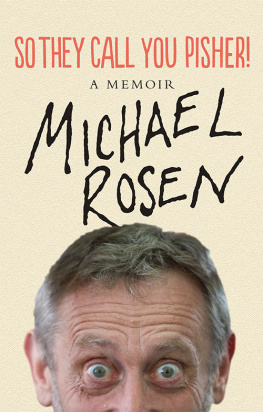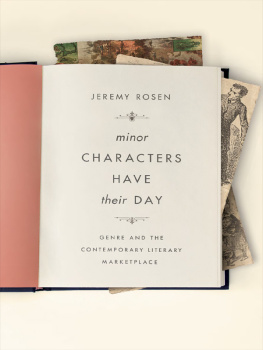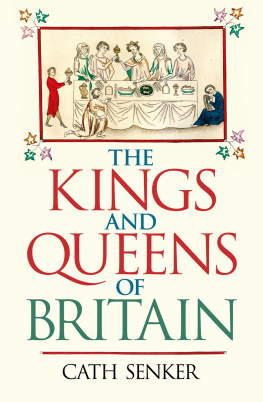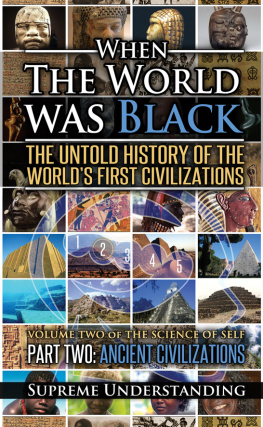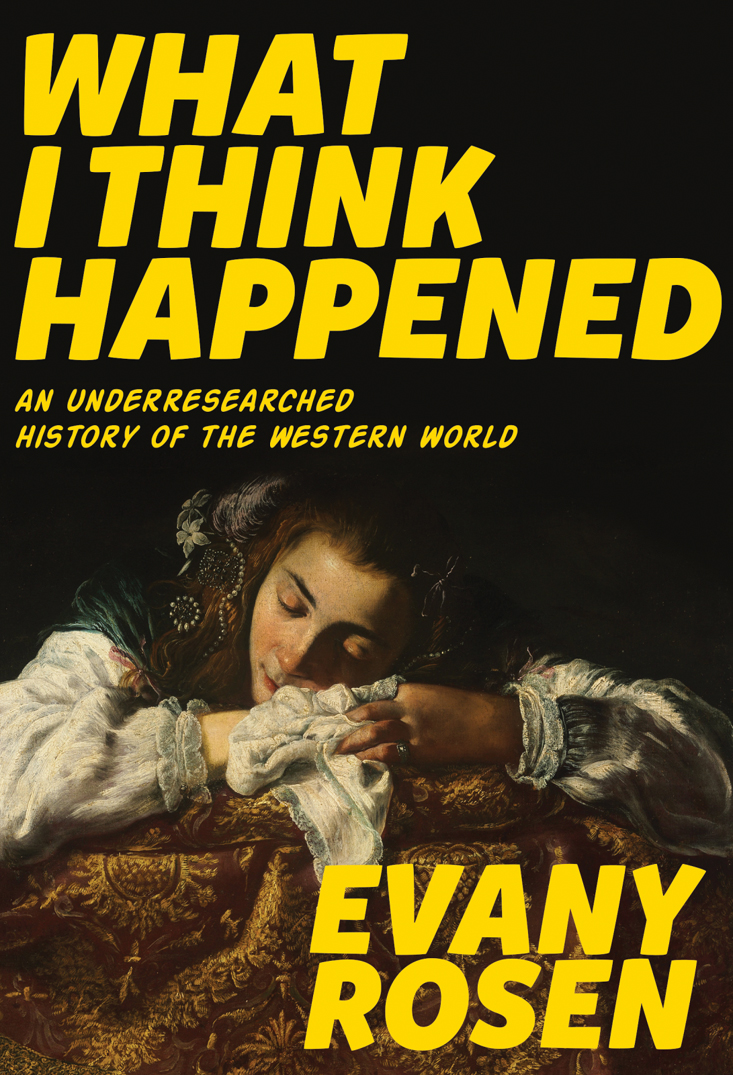

WHAT I THINK HAPPENED
Copyright 2017 by Evany Rosen
All rights reserved. No part of this book may be reproduced in any part by any meansgraphic, electronic, or mechanicalwithout the prior written permission of the publisher, except by a reviewer, who may use brief excerpts in a review, or in the case of photocopying in Canada, a license from Access Copyright.
ROBINS EGG BOOKS is an imprint of
ARSENAL PULP PRESS
Suite 202 211 East Georgia St.
Vancouver, BC V6A 1Z6
Canada
arsenalpulp.com
The publisher gratefully acknowledges the support of the Canada Council for the Arts and the British Columbia Arts Council for its publishing program, and the Government of Canada, and the Government of British Columbia (through the Book Publishing Tax Credit Program), for its publishing activities.

Edited by Charles Demers
Cover and text design by Oliver McPartlin
Cover Illustration: Sleeping Girl by Domenico Fetti, 1620
Library and Archives Canada Cataloguing in Publication:
Rosen, Evany, 1987
[Essays. Selections]
What I think happened: an underresearched history of the western world / Evany Rosen.
Issued in print and electronic formats.
ISBN 978-1-55152-696-6 (eBook)
1. Western countriesHistoryHumor. 2. Essays. I. Title.
PS8635.O6487W53 2017 | C814.6 | C2017-903899-0 |
C2017-903900-8 |
To my beloved James and my dearest Kayla, Without you this book would not exist, Nor could I.

| To be fair, I should probably also just come clean and profoundly thank Wikipedia, without which this book would also absolutely not exist.
CONTENTS

Table of Contents
Guide

WELCOME TO ROBINS EGG BOOKS
In the literary world, we have forewords. In the comedy world, we have opening actssomeone not quite as funny as the main attraction, who comes out first to get everybody warmed up. This guy over here, he knows what Im talking about. In any event, as the editor and curator of this imprint, I felt that I should set down a few words here at the beginning of this very, very good and funny inaugural book.
It must be saidabout me, Charles Demersthat I have a great eye for talent. Usually, that eye is narrowed, resentfully, in anger: Why is that talent not mine? What can I do to prevent it from flourishing and thereby drawing attention away from me? But there are rare occasions upon which I witness talent so undeniable that it forces me into an uncomfortably altruistic position, wherein I have to do what I can to share it with the world.
One such occasion was watching Evany Rosen performing stand-up comedy at the wonderful Comedy Bar in Toronto, Canada (better known as the area surrounding Toronto). A preternaturally charismatic performer, her energy was almost, but not quite, enough to draw attention away from just how brilliantly and beautifully her words had been chosen, her sentences constructed, her grammar gram-erd. It occurred to me in that moment that I would like very much to read a book written by this person. And, having been raised amidst the splendours of a lower-middle-class single parent family, I am unaccustomed to having my whims denied. Behold, thenthe very book that I willed!
Evany and I (and hopefully you, dear reader) share a love of both comedy and of history. While many humourists confine themselves, myopically, to the task of making us laugh at the horrors of the world that surrounds us, Evanys terrific book also allows us to laugh at the horrors that are behind usbecause shes smart enough to know that they arent ever really behind us. On first read, you will notice that it is funnyupon closer read, youll realize that it is also brilliant, insightful, and humane. Im very proud of itits exactly the kind of work that Id hoped this imprint would be a platform for.
Some of the people who know words, sentences, and ideas the best are, in my experience, the very funniest people. I decided that, sitting in the tiny space where Canadian letters and Canadian comedy overlap, I could play a little part in bringing the terrifically good writing of terrifically good humourists to book-readers at large. I approached my old friends at Arsenal Pulp Press who, to my great delight, immediately shared my enthusiasm. Thus was born our new humour imprint, Robins Egg Books. The name Robins Egg is a tribute to my late mother, Robin, a hilarious woman who more than anyone taught me the value of being, and delighting in other people being, funny. The term Books is a tribute to sitting New Jersey Senator Cory Booker.
Over the coming years, we will be bringing you the very best of Canadian humour writingand I am thrilled to be starting the series with the work of the very comedian, actor, screenwriter, improvisor, and, now, author who made me want to start it all up in the first place.
Welcome to Robins Egg lets get cracking.
Wait, nothats horrible. Forget the last part. Just stop reading at first place. Now start Evanys book.

The student of history is like a man going into a warehouse to buy clothes or carpets.
Ralph Waldo Emerson
History repeats itself is, itself, an unnecessarily oft-repeated phrase. Weve all heard it said, and have probably all said it ourselves at some point; almost always when we didnt have anything better to say. The original aphorism is generally attributed to Spanish-American pragmatist George Santayana, who more specifically said, Those who cannot remember the past are doomed to repeat it. And I, for one, have always found this to be a terribly flawed, if not also poorly worded, idea. Because frankly, if remembering the past really does teach us anything, its that historically speaking, the one thing we can always be counted on to do is to constantly and unabashedly repeat all of our mistakes. And so far, remembering that we constantly do that hasnt ever stopped us from doing it some more.
Or at the very least, we have to repeat these mistakes an embarrassing number of times before we finally go, Hey, actually, what if slavery really is a terrible idea though? or You know what? I think now is as good a time as any to stop assuming that odd women are in league with the devil and setting them on fire. I liked it for the first 700 years, but now it just seems rude. And even then, even when we do learn, we still have to have at least one war about it, or take things way too far before we sheepishly pump the brakes. Or, as often as not, learning just means weve found sleeker, more acceptable ways to exert the same cruelties and prejudices weve been carrying around since it was okay to own a human being or drown women who understood medicine. Which is all to sayand with no disrespect to everyones favourite turn of-the-century metaphysical naturalistuntil we can enroll all of humanity in group analysis and collectively learn how to stop behaving exactly like we always have, Santayanas point is well-taken (not really), but a tad moot.


